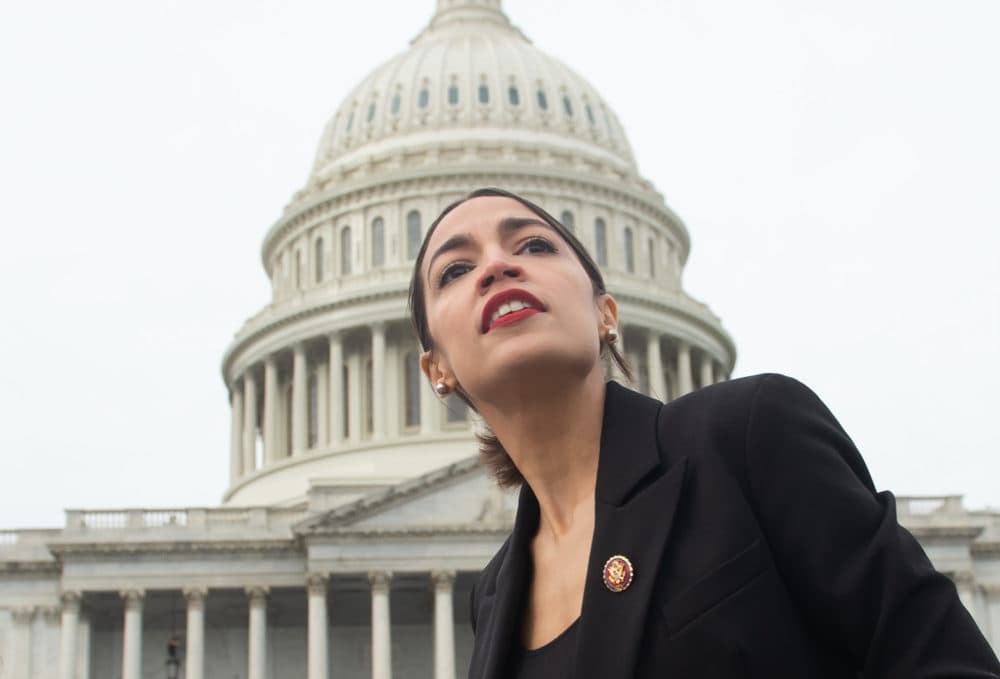Advertisement
Should The Wealthy Be Taxed More? Two Economists Weigh In
Resume
Democratic Rep. Alexandria Ocasio-Cortez's plan to raise taxes on the wealthiest Americans has stirred the pot in Washington.
Economists can't seem to agree on whether or not raising the marginal tax rate would ultimately be beneficial for the U.S. economy. Ocasio-Cortez has proposed increasing the marginal tax rate on income above $10 million to 70 percent, in an effort to reduce the nation's wealth inequality and fund the "Green New Deal," a massive policy proposal aimed at addressing climate change.
One economist, Marshall Steinbaum (@Econ_Marshall), research director at the Roosevelt Institute for Market Power and Inequality, says a 70 percent marginal tax rate isn't high enough.
"I think we now know that the economy did much better back when the top marginal tax rate was 91 percent," he says.
Chris Edwards (@CatoEdwards), director of tax policy studies at the Cato Institute, disagrees.
"It should be much lower. It should be as low as we can get. It's not reality. We're not going to go back up to a 70 percent tax rate," Edwards says. "What would happen if we tried to raise our rate that high is you'd get massive tax avoidance and evasion."
The 70 percent proposal goes beyond the political back-and-forth happening in Washington. The topic was particularly divisive at the World Economic Forum in Davos.
Erik Brynjolfsson, the director of MIT's Initiative on the Digital Economy, told a panel that the U.S. had "pretty good years" when the country implemented higher tax rates on the wealthy in the 1960s.
On that same Davos panel, billionaire Dell CEO Michael Dell rejected a 70 percent tax hike proposal completely.
"I don't think it will help the growth of the U.S. economy," Dell said.
But do economists see the tax rate as being a divisive issue to the average American?
Steinbaum says taxing the wealthy "actually offers a way of bringing this country together." And there's broad public support for a higher tax rate: A Politico/Morning Consult poll released in early February found 76 percent of registered voters in the U.S. believe the wealthiest Americans should pay more in taxes.
But Edwards says, due to the "partisan and ideological division in the country," in order to make smart decisions regarding tax rates, "we do have to look at the experiences of other countries."
"And from my point of view," Edwards adds, "it's pretty clear that the best practice around the world these days is to go to lower, flatter tax systems."
Interview Highlights
On whether higher tax rates are good for economic growth
Marshall Steinbaum: "I think that exchange [with Erik Brynjolfsson] was quite revealing about the core issues at play when it comes to progressive tax policy. For one thing, the billionaire [Michael Dell] said, ‘Well, we can allocate the money better in my private foundation, which I have total control over. I get to decide who benefits and who doesn't from the dispensation of my fortune. Or we can give it to the government, where democracy and the mechanisms of communal distribution are at play.' So I think the core issue with progressive tax policy is who do we want making decisions in our economy: billionaires or democracy?"
Chris Edwards: "We cannot go back to those high tax rates we had in the mid-20th century. Globalization has vastly changed the world economy. So the United States is not the only country that cut its top income tax rate. The average rate across industrial countries fell from 68 percent in 1980 to just 43 percent today across all of Europe and Canada and Australia. Everyone slashed their top tax rates because capital flows started going over borders and you couldn't contain wealthy people anymore. Countries realize it's in their own self-interest to have moderate tax rates at the top end and allow wealthy people to do what they do best, which is invest in the domestic economy."
On the idea that competitively, the U.S. can't keep rates high if other countries aren't doing the same
Steinbaum: "I think we have seen, indeed, lots of countries cut tax rates on the top, and that's exactly why inequality has gone up so much. We have experienced cutting tax rates. The big question in the economy right now is: Why are corporate profits so high, while corporate investment is so low, despite the fact that we just had a gigantic corporate tax cut? The economic prediction behind enacting a policy like that is that it's supposed to induce the so-called productive people in the economy to invest and expand and the rest of us benefit thereby. And we know it didn't work this time. It hasn't worked any time for the last 40 years. And that's had disastrous consequences for everybody else."
"If folks like Alexandria Ocasio-Cortez and Elizabeth Warren want a bigger government, ultimately it's going to be a mass tax on the middle class that funds it."
Chris Edwards
On how to tackle income inequality without raising taxes on the rich
Edwards: "One thing I would say about that is, it's true there is a lot of income inequality, but the U.S. economy is very dynamic. So the IRS puts their data every year on the 400 richest people in the country with the highest incomes. And they track these people over time. Three-quarters of the people in the IRS top 400 every year change. ... It's dynamic because of all the entrepreneurship, because of all the new industries being created.
"The second thing I would say is, there is income inequality created by government. So for example, crony capitalism and the federal government spends $25 billion a year on farm subsidies. Those farm subsidies go to wealthy landowners. I would eliminate policies like that, that benefit the wealthy. And then at the bottom end, the government does stuff that raises costs on low income folks. It raises the cost of gasoline with ethanol mandates. It raises the cost of clothing and shoes with import tariffs. So I would try to get government out of the way when it itself is exacerbating inequality."
Steinbaum: "I think the fundamental debate that we're having here is a question about whether there exists a moral hierarchy of wealth. I think there is a tradition within the field of economics and in general public debate that the reason why good, wealthy people are wealthy is because the government did not intervene. Instead, it allowed their brilliant ideas to take flight and incur the income and wealth that they merited in the free market. I mean, it makes sense in kind of economic theory, but it just so happens that that theory has nothing to do with reality."
"I think the core issue with progressive tax policy is who do we want making decisions in our economy: billionaires or democracy?"
Marshall Steinbaum
On foreign governments financing their tax rates
Edwards: "I mean, European governments are bigger than the U.S. government. But how do they finance it? The only way you can finance it is by having a mass tax on the middle class. In Europe, it is called the value added tax. It's 20 percent on average on everything people buy clothing, food and automobiles, etc., are all taxed at that 20 percent in Europe. So, if folks like Alexandria Ocasio-Cortez and Elizabeth Warren want a bigger government, ultimately it's going to be a mass tax on the middle class that funds it."
Cassady Rosenblum produced this interview and edited it for broadcast with Peter O'Dowd. Serena McMahon adapted it for the web.
This segment aired on February 14, 2019.

